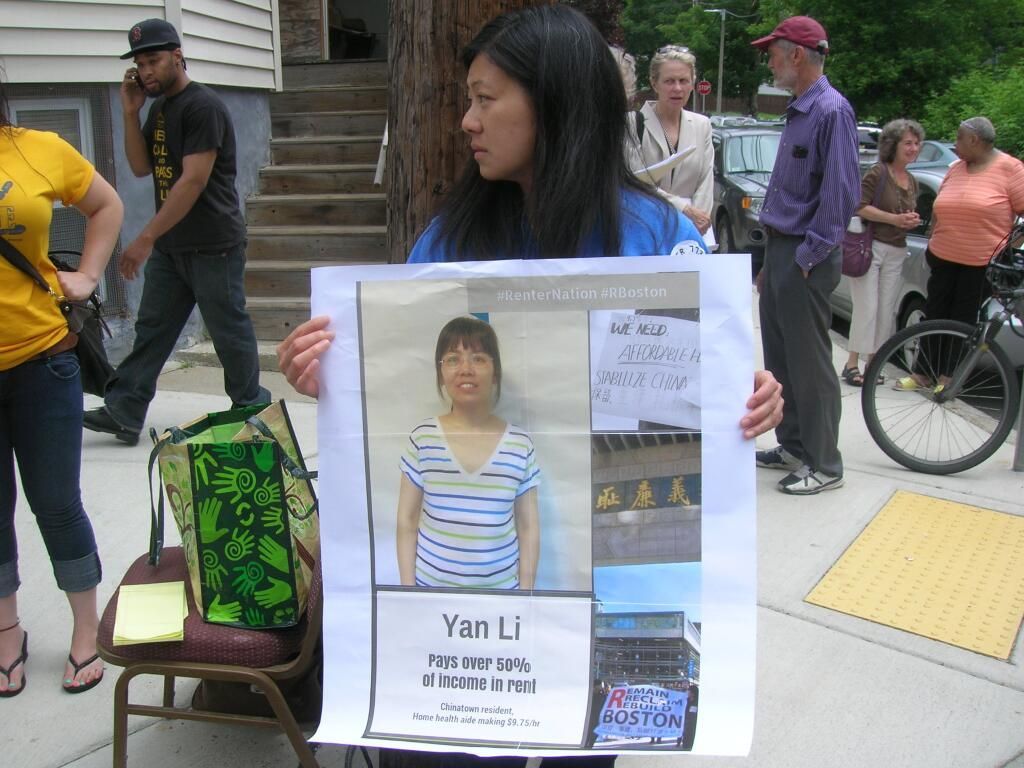BOSTON, Mass.—As part of the affordable housing movement, a reaction to the City of
Boston’s rocketing rental prices, the Chinese Progressive Association (CPA) rallied in
Dorchester today to shine a light on those who have been evicted.
The backdrop of the rally was an ill-painted white duplex, half of which is empty. This a Federal
National Mortgage Association (Fannie Mae)-owned apartment, located on 193 Norwell Street in
Dorchester. It evicted its tenants for refusing to engage in foreclosure buyback programs, causing
them to lose their property.
“[Fannie Mae] is waiting for richer tenants to live in this house,” Mike Leyba, Communications
Coordinator of City Life, said. City Life is an organization in Jamaica Plain with a focus on
affordable housing and tenants’ rights.
According to a recent study, challenges have mounted over the years as people who live in
Dorchester find it harder to pay the rent on apartments that used to be affordable, according to a
recent study.
Executive Director of CPA, Lydia Lowe said that the median income of Dorchester’s residents is
around $37,000. According to CPA, more than 31,000 Boston households that make $50,000 or
less pay over half of their income in rent.
“Median household income for Boston renters is $38,000,” Lowe said.
The eviction of tenants in the Dorchester apartment created a ripple effect on Chinatown
residents too. They fear that gentrification will eventually spread out all over the city, and
Chinatown will be a place where Chinese immigrants no longer live.
“Remain, reclaim, rebuild our community,” members from CPA and Chinatown residents
screamed on the sides of Norwell Street, waving banners printed in both Chinese and English to
passersby.
The rally means a lot to Huang Yong Sheng, one of the former Chinatown residents who were
kicked out of their apartments by police enforcement for allegedly trespassing on the property in
2011. As he came to the United States illegally and worked at a local restaurant for about a year,
a monthly rent of $450 in one of the housing projects near Chinatown was all he could pay.
“The [Chinatown apartment’s] landlord didn’t give me any lease or paperwork when I first
moved in,” Huang said in Mandarin. “Nor did he give one to my four other roommates. Before
the police came to knock on the door and caught us, the other four tenants were gone already.
They were scared.”
After Huang was evicted from the housing project, he transitioned from shelter to shelter in
different parts of Boston area.
“It was a tough time,” Huang said. “I remember in one of the shelters, someone took a dump in
front of my bed.”
RCT Vote Boston (Right to the City), a national alliance on racial, economic, and environmental
justice organization, tweeted that between 2006 and 2012, over 4,500 families have been the
victims of foreclosure in Boston. The majority of those families were displaced and pushed into
“renter nation.”
Paul Adamson is among those who were evicted by Fannie Mae-owned houses, albeit he’s
willing to pay the rent or buy the house.
“We are here to stabilize our communities,” Adamson said. The community came together to
support the Adamson family’s taking up residence in this vacant Dorchester apartment. As City
Life staff mentioned, they want to show “the practical solutions to the housing crisis that we
have at our fingertips.”
Around the same time last year, Coalition For Occupied Homes In Foreclosure (COHIF)
launched a new step of Community Stabilization Pilot Project. It focuses on partnering with
residents and the City of Boston to identify and help enforce code violations on bank-owned
foreclosed and vacant properties in the Greater Four Corners neighborhoods of Dorchester.
MassLive reported earlier this month that Attorney General Martha Coakley filed a lawsuit in
Suffolk Superior Court against two major lenders and federal regulators for violating the state’s
2012 foreclosure prevention law. Fannie Mae is one of the defendants.
“Now [Fannie Mae] is negotiating to sell the property to a non-profit organization,” Steve
Meacham, Coordinator of Organizing of City Life, said. “If they sell it for $100,000, the rent will
be affordable for residents here.”

Leave a Reply
You must be logged in to post a comment.